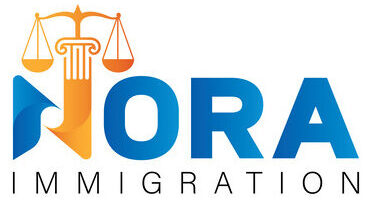Introduction
For many people around the world, the United Kingdom represents opportunity, stability, and a promising future. Whether you are joining family, pursuing higher education, building a career, or starting a business, the first step in your journey begins with securing the right visa. Yet, with frequent changes to immigration rules, applicants often find the process overwhelming.
This guide is designed to help you navigate UK borders with confidence in 2025. It will walk you through visa categories, eligibility requirements, common challenges, and proven strategies for a successful application. At Nora Immigration, we believe that preparation and knowledge are the keys to visa success—and this comprehensive guide reflects that approach.
Understanding the UK Visa System
The UK offers multiple visa categories, each tailored to specific circumstances. Choosing the correct category is the foundation of a successful application.
Major UK Visa Categories in 2025
-
Family Visas – For spouses, partners, children, and dependent relatives of British citizens or settled persons.
-
Work Visas – Including the Skilled Worker visa, Health and Care Worker visa, and Global Talent visa.
-
Study Visas – For international students enrolled in UK educational institutions.
-
Business & Investor Visas – For entrepreneurs, innovators, and investors.
-
Visitor Visas – Short-term visas for tourism, business visits, and family visits.
-
Settlement & Citizenship – For those seeking Indefinite Leave to Remain (ILR) or British nationality.
Selecting the wrong visa type can lead to rejection, wasted fees, and delays in your plans.
The Core Requirements for UK Visa Success
While each visa has specific rules, there are universal requirements that applicants must meet.
1. Financial Evidence
Applicants must demonstrate they have sufficient funds to support themselves and any dependants. For family visas, this may mean meeting the minimum income requirement. For work and study visas, evidence of salary or savings is often required.
2. English Language Ability
Most visas require proof of English proficiency, either through an approved test (such as IELTS for UKVI) or academic qualifications taught in English.
3. Relationship Evidence (for Family Visas)
Spouses and partners must provide detailed documentation proving their relationship is genuine and subsisting—marriage certificates, photographs, joint bills, and communication records.
4. Health and Character Checks
Applicants may need to provide a tuberculosis (TB) test certificate, medical insurance details, and police clearance certificates, depending on the visa type and country of origin.
5. Accurate Documentation
From passports and biometric residence permits (BRPs) to payslips and tenancy agreements, every document must be valid, up-to-date, and consistent.
Common Challenges Applicants Face
Despite their best efforts, many applicants encounter difficulties. Recognising these challenges in advance is key to overcoming them.
-
Changing Immigration Rules: The UK regularly updates visa thresholds and requirements. Staying current is essential.
-
Incomplete Applications: Missing forms or incorrect documents can lead to refusals.
-
Insufficient Evidence: Failure to demonstrate finances, English ability, or relationship proof is a frequent reason for rejection.
-
Tight Deadlines: Applications tied to job offers or academic terms often have strict timelines.
-
Appeals and Reapplications: A refusal may require additional legal steps, adding stress and cost.
Step-by-Step Approach to Visa Success
Step 1: Identify the Correct Visa Category
Begin by assessing your goals—family, work, study, or settlement—and match them to the correct visa.
Step 2: Review Eligibility Criteria Thoroughly
Carefully read the official requirements. Do not assume your circumstances meet them without proper checks.
Step 3: Gather Strong Supporting Documents
Organise your financial records, employment contracts, academic transcripts, and relationship evidence in advance. Consistency is vital.
Step 4: Prepare for English Language or Knowledge Tests
Book tests early and prepare thoroughly. Examples include IELTS for English ability and the Life in the UK Test for settlement.
Step 5: Submit a Complete, Error-Free Application
Double-check every entry. Even small errors, such as misspelling a name, can cause complications.
Step 6: Be Ready for Additional Checks
Some applicants may be called for interviews or asked to provide extra documentation. Respond promptly and accurately.
Step 7: Seek Professional Guidance
Working with experienced immigration advisers, like Nora Immigration, ensures applications are built on accuracy, compliance, and strategy.
Practical Tips for a Smooth Application
-
Start Early: Allow plenty of time for document gathering and test booking.
-
Keep Copies: Always maintain duplicates of every document submitted.
-
Stay Informed: Follow official announcements about immigration changes in 2025.
-
Be Honest: Never submit false or misleading information—it can result in bans.
-
Communicate Clearly: If contacted by UKVI, respond promptly and provide requested information in full.
What Happens If Your Visa Is Refused?
A refusal does not mean the end of your UK journey. Depending on the type of visa, you may:
-
Appeal the Decision: Some refusals can be challenged in court or through an administrative review.
-
Submit a Fresh Application: Often the faster option, provided errors are corrected.
-
Seek Expert Help: Immigration specialists can assess your case, identify weaknesses, and rebuild a stronger application.
The Role of Professional Immigration Support
Immigration rules can be complex, and mistakes are costly. Professional guidance provides:
-
Accurate interpretation of rules as they apply to your case.
-
Personalised strategies for meeting financial or evidential requirements.
-
Error-free applications, reducing the risk of refusal.
-
Support with appeals and reviews in the event of a negative decision.
At Nora Immigration, we pride ourselves on delivering clarity and confidence to applicants navigating UK borders.
Frequently Asked Questions
1. How long does a UK visa application take?
Processing times vary by visa type, but most take between 3 to 12 weeks. Priority services may be available.
2. What happens if I submit the wrong documents?
Your application may be refused. Always ensure documents meet UKVI standards.
3. Can I switch from one visa category to another inside the UK?
In some cases, yes—for example, switching from a Student visa to a Skilled Worker visa. Always check current rules.
4. Are all visa fees refundable if refused?
No. Visa fees are generally non-refundable, even if refused.
Conclusion
Securing a UK visa in 2025 requires careful preparation, accurate documentation, and an understanding of complex immigration rules. While the process can be challenging, it is entirely achievable with the right guidance.
At Nora Immigration, we help applicants navigate borders with confidence, providing personalised advice and tailored support to maximise your chances of success. Whether you are applying for a family, work, study, or settlement visa, our expertise ensures you are never navigating the process alone.


